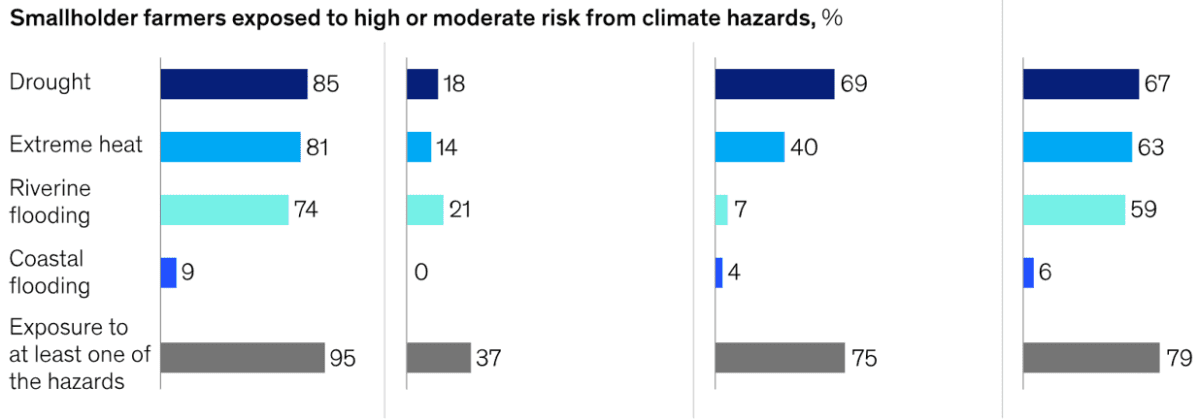McKinsey Report Identifies Climate-Smart Agriculture Measures for Smallholder Farmers

A new report by McKinsey & Company has found that climate change will have a severe impact on smallholder farmers in India, Ethiopia, and Mexico, with up to 80% of such farmers likely to be affected by climate hazards such as drought, flooding, and extreme heat. The report, titled “What climate-smart agriculture means for smallholder farmers”, also highlights that climate change will affect land suitability for crop production, with India alone set to lose 450,000 square kilometers of land currently usable for rain-fed rice cultivation. Despite smallholder farmers producing 32% of the world’s agriculture-related greenhouse gas emissions and being among the most vulnerable to climate change, there is currently no clear roadmap for adopting countermeasures or prioritizing necessary investments to support smallholders in mitigating and adapting to climate change.
The report identifies 33 climate adaptation and mitigation measures for smallholder farmers, ranging from rotational grazing to dry direct-seeding technologies, and calls for governments and the private sector to form clusters of similar smallholder farmers to scale up the adoption of multiple measures. It also suggests investing in climate-resilient infrastructure, forming national agricultural research systems pioneering new technologies, and helping farmers bring sustainable new crops to market. Climate-resilient farming practices will be vital in reducing global inequality and driving inclusive growth, given smallholder farmers’ disproportionate vulnerability to climate risks, and the fact that they produce a third of the world’s food while demand is set to soar 60% by 2050.
Additionally, the report recommends building land management plans around reducing climate hazards, increasing crop insurance, and better food security planning to mitigate climate risks, and using taxes, subsidies, and other incentives to encourage sustainable farming. The report also emphasizes the need for further guidance on which measures to prioritize in each region, as the applicability of measures varies across and within countries due to different farming systems and practices. For instance, fertilizer application rates are five times higher in India than in Ethiopia, making soil- and fertilizer-related mitigation measures a higher priority in India.
According to the report, 75% of smallholder farmers could feasibly adopt at least three of the adaptation measures identified, and the more they implement, the greater their climate resilience will be. The report also notes that smallholder farmers account for a third of CO2 emissions from agriculture and food supplies, and implementing climate-smart agriculture could reduce greenhouse gas emissions while supporting vulnerable populations and improving global food security.
However, smallholder farms are often fragmented and have limited access to inputs, new technologies, and financing, which makes climate adaptation and mitigation challenging. Governments, financiers, development organizations, and private-sector players have a key role to play in supporting the shift to more sustainable practices among smallholder farmers, prioritizing measures, identifying clusters of farmers for implementation of these measures, and piloting business models or incentives to drive adoption. For example, in Africa, some actors are already piloting efforts to connect smallholders to carbon markets or to climate-smart lending, encouraging adoption of these practices.



